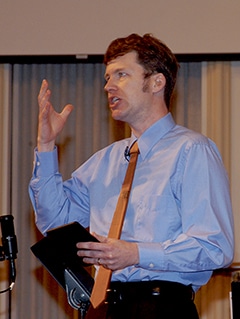JEFFERSON CITY, Mo. — Christians should approach race as the brilliance of vibrant colors, rather than to continue trying to become colorblind.
 Brian Kaylor focused on the need for believers to see race issues clearly in his sermon to attendees at the Churchnet (Baptist General Convention of Missouri) Annual Gathering April 24 at First Baptist Church in Jefferson City.
Brian Kaylor focused on the need for believers to see race issues clearly in his sermon to attendees at the Churchnet (Baptist General Convention of Missouri) Annual Gathering April 24 at First Baptist Church in Jefferson City.
Often referring to the color blue, Kaylor, Churchnet’s communications and engagement team leader, drew from Clarence Jordan’s life and work to emphasize that believers need to see “new colors” to understand and apply Bible stories to contemporary issues, especially race relations.
Jordan, who earned a doctorate in New Testament Greek at Southern Baptist Theological Seminary, created Koinonia Farm, an agricultural and spiritual community for blacks and whites, with his wife Florence in Georgia in 1942.
Because Koinonia Farm treated all people equally and called for racial reconciliation, Jordan, his family and the community were attacked during the civil rights movement in the 1940s and 1950s.
Though others of the time believed the United States was a Christian nation, Jordan felt it was not, Kaylor explained.
Contemporary Christian philosophy claims colorblindness to black/white racial issues and that today’s America is a post-racist society. But Kaylor believes that the perception is wrong.
Translation and interpretation of Scripture can add to misunderstanding, he added. Greek words in the New Testament that can be translated as “justice” are, instead, translated as “righteousness” in many Bible versions. The Message version replaces “peace” in the Apostle Paul’s list of the gifts of the Spirit with “serenity.”
But Paul was concerned with how people relate to each other, rather than how nice believers feel inside, Kaylor said.
“Jordan gives me hope” as an example, Kaylor said. Jordan’s interpretation of Scripture — published as the Cotton Patch Gospels — help people see “new colors,” the application of Jesus’ teachings to life.
The Churchnet team leader criticized Christians who privatize their faith. Individualistic faith “reduces racism to merely an interpersonal issue” and does not eliminate injustice at systemic levels, he said.
Individualistic, colorblind faith leads to belief in the “justice of punishment,” he added.
Believers today “must be people…who see what others can’t or won’t see,” he challenged his listeners.
Today’s world need more “imaginative prophets,” like Jordan, who show “the colors of the gospel,” Kaylor said. “We need to tell stories to help others see new colors, dream new dreams, see new realities.”
And believers need to figure out how to read the Bible to grasp and promote justice.

